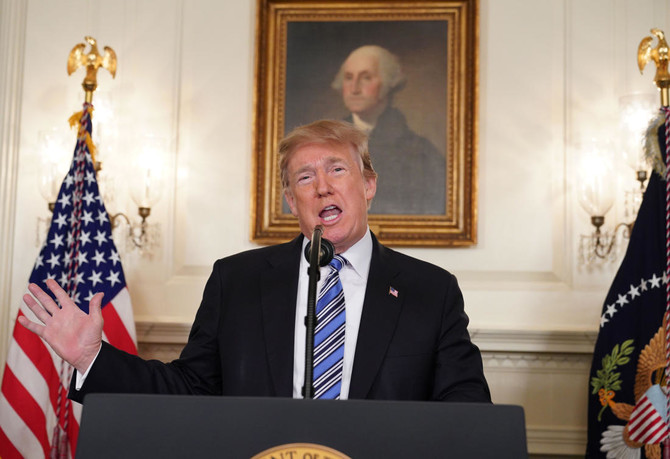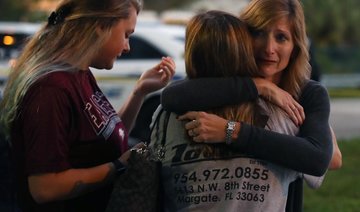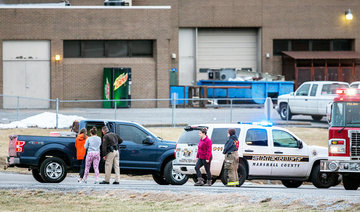WASHINGTON: President Donald Trump struck a solemn tone Thursday after the deadly school shooting in Florida, describing a “scene of terrible violence, hatred and evil” and promising to “tackle the difficult issue of mental health,” but avoiding any mention of guns.
Taking up the now-familiar ritual of public consolation after terrible violence, Trump spoke from the White House Diplomatic Room. In a slow, deliberate style, he sought to reassure a troubled nation as well as students’ families and shooting survivors in Florida.
“We are all joined together as one American family, and your suffering is our burden also,” Trump said. “No child, no teacher, should ever be in danger in an American school.”
Trump, who owns a private club in Palm Beach, Florida about 40 miles from the town of Parkland, where the shooting happened, said Thursday he was making plans to visit the grieving community.
He did not answer shouted questions about guns as he exited the room.
The president’s address came a day after a former student opened fire at the Parkland, Florida, high school with an AR-15 rifle, killing 17 people and injuring 14 more. It was the nation’s deadliest school shooting since a gunman attacked an elementary school in Newtown, Connecticut, more than five years ago.
At the Capitol, the usual divisions over gun laws were evident.
House Minority Leader Nancy Pelosi, a California Democrat, said in a statement that it is time for action. “Congress has a moral responsibility to take common-sense action to prevent the daily tragedy of gun violence in communities across America,” she said. “Enough is enough.”
Senate Majority Leader Mitch McConnell, a Republican from Kentucky, did not mention guns as he said the Senate would observe a moment of silence at noon. “To say that such brutal, pointless violence is unconscionable is an understatement,” he said.
Before he was a candidate, Trump at one point favored some stricter gun restrictions. However, early in his administration, he told the National Rifle Association he was their “friend and champion.” He signed a resolution passed by the GOP-led Congress blocking an Obama-era rule designed to keep guns out of the hands of certain mentally disabled people.
Trump on Thursday praised teachers and first responders and also offered a direct message to children.
“I want you to know that you are never alone and you never will be,” Trump said. “You have people who care about you who love you and who will do anything at all to protect you. If you need help, turn to a teacher, a family member, a local police officer or a faith leader. Answer hate with love, answer cruelty with kindness.”
Trump also pledged that his administration would work with state and local officials to improve school safety and to “tackle the difficult issue of mental health.”
He later added that “it is not enough to simply take actions that make us feel like we are making a difference, we must actually make that difference.”
Trump, who did not speak publicly immediately after the shooting, weighed in on Twitter early Thursday, calling the suspect “mentally disturbed” and stressing it was important to “report such instances to authorities, again and again!” He tweeted about the shooting twice on Wednesday, expressing condolences and saying he spoke with Florida’s governor.
The president also issued a proclamation mourning the victims and ordering American flags at public buildings across the country flown at half-staff.
Trump has offered consolation before after horrific violence. A mass shooting in Las Vegas last year was the deadliest in modern history, with a gunman killing 58 people and injuring hundreds more, before killing himself. And a shooting in a Texas church in November left more than two dozen dead.
He has largely focused on mental health as a cause for mass shootings, dismissing questions about gun control.
After the Texas church shooting, the president said, “This isn’t a guns situation.” When he visited Las Vegas to mourn with the families of those victims, Trump called the shooter “demented” and a “very sick individual,” though he added that “we’ll be talking about gun laws as time goes by.”
The 19-year-old suspect, Nikolas Cruz, is a troubled teenager who posted disturbing material on social media. He had been expelled from Marjory Stoneman Douglas High School for “disciplinary reasons,” Broward County, Florida, Sheriff Scott Israel said.
Mayor Beam Furr said on CNN that the shooter was getting treatment at a mental health clinic for a while, but that he hadn’t been back to the clinic for more than a year.
While Trump has offered sober responses to some tragedies since he took office, he has also drawn criticism for more inflammatory reactions to acts of violence.
After the Orlando shootings at a gay nightclub that left 49 dead, he tweeted, “Appreciate the congrats for being right on radical Islamic terrorism.” In the wake of a deadly terror attack in London in June, he went after the Mayor Sadiq Khan on Twitter, suggesting he wasn’t taking the attacks seriously enough.
Trump cites mental health in shooting, no mention of guns
Trump cites mental health in shooting, no mention of guns

Trial opens into UK stabbing spree that sparked riots over misinformation attacker was Muslim

- Authorities blame far-right agitators for violence, including by sharing misinformation alleged attacker was Muslim asylum seeker
- Unrest, which lasted several days, saw far-right rioters attack police, shops, hotels housing asylum seekers and mosques
LONDON: The trial of a teenager accused of killing three young girls in a stabbing spree last year that sparked the UK’s most violent riots in a decade is set to begin Monday.
Axel Rudakubana, 18, is due to stand trial at Liverpool Crown Court, accused of murdering three girls at a Taylor Swift-themed dance class last year in Southport, northwest England.
Bebe King, six, Elsie Dot Stancombe, seven, and Alice da Silva Aguiar, nine, were killed in the attack in the seaside resort near Liverpool on July 29, 2024.
Ten others were injured, including eight children, in one of the country’s worst mass stabbings in years.
Rudakubana faces a total of 16 charges, including three counts of murder, 10 counts of attempted murder and one count of possessing a blade days after the attack.
The trial is expected to last four weeks after pleas of not guilty were entered on his behalf.
The stabbings sent shock waves across the UK, triggering unrest and riots in more than a dozen English and Northern Irish towns and cities, including in Southport and Liverpool.
Authorities blamed far-right agitators for fueling violence, including by sharing misinformation claiming the alleged attacker was a Muslim asylum seeker.
The unrest, which lasted several days, saw far-right rioters attack police, shops, hotels housing asylum seekers and mosques, with hundreds of participants subsequently arrested and charged.
Rudakubana was born in Wales to parents of Rwandan origin and lived in Banks, a village northeast of Southport.
Despite being 17 years old at the time, restrictions on reporting Rudakubana’s name were lifted in August due to concerns over the spread of misinformation.
“Continuing to prevent the full reporting has the disadvantage of allowing others to spread misinformation, in a vacuum,” judge Andrew Menary said as he lifted the restrictions.
Taylor Swift, then in the middle of her Eras tour, wrote on Instagram that she “was completely in shock” the day after the attack on the dance class at the start of the school holidays.
The pop star reportedly met two of the survivors of the attack during her August shows in London.
The UK’s head of state King Charles III also traveled to Southport in August to meet with survivors, inspecting a sea of floral tributes laid outside the city’s town hall.
And Catherine, Princess of Wales, and Prince William visited Southport in October “to show support to the local community,” Kensington Palace said. It was their first joint public engagement since Kate ended a course of chemotherapy for cancer.
In October, the suspect was charged with two additional offenses in relation to evidence obtained “during searches of Axel Rudakubana’s home address” following the attack, the Crown Prosecution Services (CPS), which brings public prosecutions, said.
The charges were for the “production of a biological toxin, namely ricin,” and “possessing information ... likely to be useful to a person committing or preparing an act of terrorism.”
The terrorism offense related to suspicion of possessing an Al-Qaeda training manual, although the attack was not treated as a terrorist incident.
Following speculation on social media related to policing decisions in the case, Chief Constable Serena Kennedy said she realized the added charges could trigger fresh rumors.
“We would strongly advise caution against anyone speculating as to motivation in this case,” Kennedy was quoted as saying.
She urged people to be patient and “don’t believe everything you read on social media.”
Rudakubana has appeared in several hearings since the attack, often wearing a grey sweatshirt, and refusing to speak in all of them.
In the last hearing in December, he appeared via videolink at Liverpool Crown Court from high-security Belmarsh prison, in southeast London.
The Attorney General and Merseyside police have warned the press and public against publishing any material that risks prejudicing the trial.
Russia says captured two more villages in east Ukraine

MOSCOW: Russian forces have captured two more villages in east Ukraine, including one just a few kilometers from Pokrovsk, a key supply hub for Kyiv’s forces, the defense ministry said Monday.
Army units “liberated” Shevchenko and Novoyegorivka in the eastern regions of Donetsk and Lugansk respectively, it said. Shevchenko is around three kilometers (two miles) from Pokrovsk.
Indian police volunteer gets life sentence for rape, murder of Kolkata junior doctor

- Sanjay Roy was convicted by judge Anirban Das on Saturday who said circumstantial evidence had proved the charges against him
- The sentence was announced in a packed courtroom as the judge allowed the public to witness proceedings on Monday
KOLKATA: An Indian court awarded the life sentence on Monday to a police volunteer convicted of the rape and murder of a junior doctor at the hospital where she worked in the eastern city of Kolkata.
The woman’s body was found in a classroom at the state-run R G Kar Medical College and Hospital on Aug. 9. Other doctors stayed off work for weeks to demand justice for her and better security at public hospitals, as the crime sparked national outrage over a lack of safety for women.
Sanjay Roy, the police volunteer, was convicted by judge Anirban Das on Saturday who said circumstantial evidence had proved the charges against Roy.
Roy said he was innocent and that he had been framed, and sought clemency.
The federal police, who investigated the case, said the crime belonged to the “rarest-of-rare” category and Roy, therefore, deserved the death penalty.
Judge Das said it was not a “rarest-of-rare” crime, adding that Roy could go in appeal to a higher court.
The sentence was announced in a packed courtroom as the judge allowed the public to witness proceedings on Monday. The speedy trial in the court was not open to the public.
The parents of the junior doctor were among those in court on Monday. Security was stepped up with dozens of police personnel deployed at the court complex.
Myanmar military, minority armed group agree ceasefire, China says

- The two sides held talks in China’s southwestern city of Kunming
- Analysts say China is worried about the advance of anti-junta forces
BEIJING: The Myanmar military and the Myanmar National Democratic Alliance Army (MNDAA) signed a formal agreement for a ceasefire that began on Saturday, China’s foreign ministry said, halting fighting near the border of both countries.
The two sides held talks in China’s southwestern city of Kunming where they thanked Beijing for its efforts to promote peace, ministry spokesperson Mao Ning said during a regular news briefing on Monday.
“Cooling down the situation in the north of Myanmar is in the common interest of all parties in Myanmar and all countries in the region, and contributes to the security, stability and development of the border areas between China and Myanmar,” she said.
China will continue to actively promote peace and dialogue and provide support and assistance to the peace process in northern Myanmar, Mao said.
The MNDAA is one of several ethnic minority armed groups fighting to repel the military from what they consider their territories.
It is part of the so-called Three Brotherhood Alliance, with the Ta’ang National Liberation Army and the Arakan Army, that launched an offensive against the military junta in late October 2023 seizing swathes of territory near the border with China.
The MNDAA, made up of ethnic Chinese, said last July it had taken control of a major military base near the Chinese border.
Analysts say China is worried about the advance of anti-junta forces which have pushed the military out of vital borderlands and started making inroads toward the central city of Mandalay.
The military seized power from Myanmar’s civilian government in February 2021, plunging the country into crisis.
China fears chaos along its more than 2,000 kilometer long border with Myanmar would jeopardize investment and trade.
Beijing previously brokered a ceasefire deal in the northern borderlands in January 2024, but the deal broke down a few months later.
France to keep fighting for release of French-Israeli hostages, says foreign minister

PARIS: France will keep fighting to obtain the release of the two French-Israeli nationals held by Hamas, foreign minister Jean-Noel Barrot told BFM TV on Monday.
“We will continue to fight until the last hour for their release,” Barrot told BFM TV, adding France had “no news on their health status nor on the terms of their detention.”
Hamas released three Israeli hostages and Israel released 90 Palestinian prisoners on Sunday, on the first day of a ceasefire suspending a 15-month-old war that has devastated the Gaza Strip and inflamed the Middle East.
French-Israeli nationals Ofer Kalderon and Ohad Yahalomi are expected to be on the list of 33 hostages to be released in the first phase of the draft Israel-Hamas ceasefire deal.


















